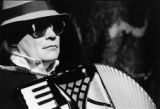
About twenty years ago, the center of the accordionist’s life shifted to Vienna, where he has ever since enriched the music scene with his varied work. Yet the Lower Austrian has not only made a name for himself in Austria. As a true virtuoso on the accordion, Otto Lechner also enjoys a high international reputation. A few years ago he was awarded for his accordion solo program “The Dark Side of the Accordion” with the prestigious National Radio Award at the Australian Broadcasting Corporation.
Otto Lechner’s work is characterized by the fact that he constantly redefines the playing limits of the accordion. When it comes to bringing his ideas to their fullest potential, he does not have any restricted perceptions. Being open to all sides is the credo of the now 66-year-old. It is always amazing what new sounds he is able to elicit from his instrument, thus giving an extra dimension to his compositions.
The musical background of Otto Lechner is very varied and diverse and this amazes all the more how he is able to combine traditional Viennese songs, jazz, waltz, and blues in all its varieties with such ease. In short intervals, monumental melodies and fragile, delicate soundscapes alternate with pure improvisation. This mixture creates a special climax of tension, which consistently offers the audience a lot of surprises.
Otto Lechner and his ensemble Windhund are no strangers to the music world in North and East Africa. Together with his co-musicians Melissa Coleman, Mathias Jakisic, Karl Ritter and Peter Rosmanith, as well as the Zansibar-based zumari horn duo Siga Duo & Sekembuke, Lechner tries to merge Arabic and European music traditions with African-inspired sounds. In the next months the ensemble Windhund will be on an extensive concert tour in East Africa. During the tour the ensemble will also visit a disability hospital in Dar es Salaam, Tanzania, which is supported by LIGHT FOR THE WORLD .
